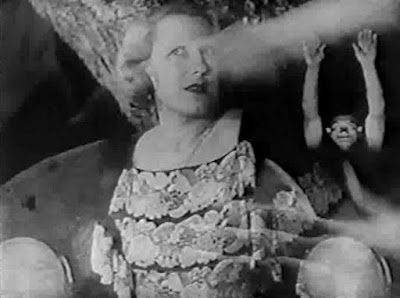Also known as The Love Wanga, this 1935 voodoo-themed film is a fascinatingly messy snapshot of racial politics in the mid-1930s. It's a racist movie made by white filmmakers about subjects they don't understand and can't experience, but it's also a black movie with a majority black cast who find moments to make the movie their own, in both subtle and overt ways. It's considered the second zombie movie in film history (White Zombie is supposed to be the first), though I don't know how these claims are verified considering how many films from the first 40 years of cinema have been lost. Whatever the facts, Ouanga contains some of the first cinematic depictions of zombies.
The final film of director George Terwilliger (journalist turned screenwriter turned director), though he would live for another 35 years, Ouanga was intended to be shot on location in Haiti. The film crew and the Haitian locals did not get along, however, and the production quickly relocated to Jamaica, but not before the unscrupulous props department stole several objects from Haiti. (Similar problems occurred on another voodoo film made by white Americans, The Serpent and the Rainbow, in the 1980s, causing a move from Haiti to the Dominican Republic, though that crew managed to shoot the bulk of the film in Haiti before things went wrong.)
Ouanga is primarily the story of Klili Gordon, a biracial plantation owner and voodoo priestess in Haiti in love with white plantation owner Adam Maynard (Philip Brandon), in a variation on the "tragic mulatto" stereotype. Klili had a fling with Adam until he went off to New York to hook back up with his white fiancée, the milquetoast high society girl Eve (Marie Paxton), and bring her back to Haiti, along with some of their hired help from Harlem. Klili secretly follows Adam to New York and confronts him on the cruise ship back to Haiti, where Adam says she needs to get over him and stick with her "own kind." She decides to place a ouanga (death charm) on Eve to get Adam back, and she even enlists the help of two zombies when extreme measures are needed to make the plan succeed. Meanwhile, one of Adam's servants, LeStrange, is in love with Klili and working some voodoo of his own.
Despite all the other black roles being played by black actors, LeStrange is played by a white guy of Jewish-European heritage, Sheldon Leonard. Leonard is thankfully not in blackface, though some kind of bronzer seems to have been used to make him look tan. I'm not sure why the producers decided to go with Leonard in this role, though there is a possibility they thought he was biracial, since a studio executive made that same assumption after watching Leonard in a previous role and wondered why he was kissing a white woman. Racism is insane.
Klili is played by Fredi Washington, a biracial woman whose parents were also both biracial. She started her showbiz career as a Broadway chorus girl and was a protégé of Josephine Baker's. After a successful dance career on the stage, she started acting in movies in the 1920s, with notable roles in Black and Tan, The Emperor Jones, and the 1934 Imitation of Life. Frustrated at the lack of opportunities for black actors in the film industry, Washington quit the movies for acting roles in radio, and she also returned to Broadway as both an actor and a casting consultant. She eventually became just as disillusioned at the lack of opportunities in those mediums. The remainder of her life was spent as a theater critic and editor for black-owned newspapers and magazines and as a civil rights activist. A light-skinned woman, Washington was urged by some in the business to pass as white, a move she rejected and spoke out against. She died at the age of 90 in 1994.
Washington steals nearly every scene in Ouanga, but the film has a strange ambivalence about whether she should be seen as the hero or the villain. It's hard to have any sympathy for the white plantation-owning characters, though the filmmakers clearly do (though they also empathize somewhat with Klili), and it's also hard to see black actors having to perform the ridiculous dialogue written for them by white people even if they get to put their own spin on it. Still, the film's location shooting gives it a vibrancy that would have been missing on studio sets, and the black actors, despite the material, rescue the movie from being a doddering snooze. A mixed bag, for sure, but an interesting piece of film history.










.jpg)



